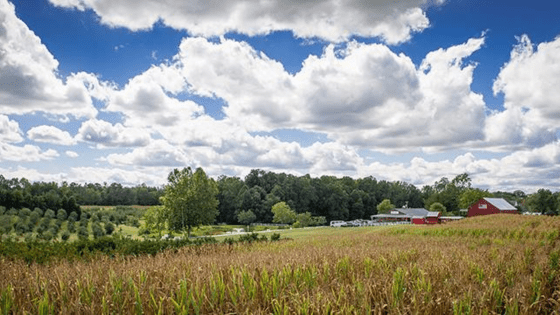The story of Forrest Hall Farm is all about resilience and adaptation. This fifth-generation family farm sits in the beautiful Southern Maryland countryside. Since its founding by Joseph A. Wood in 1917, the farm has seen many changes.
Initially focused on tobacco farming, Forrest Hall Farm pivoted when the Maryland Tobacco Buyout Program came into play in 2000. The program, initiated with funds from a settlement with major tobacco companies, offered tobacco growers payment based on their previous crop history in agreement to permanently cease tobacco production for cigarette manufacturing and similar personal consumption. It was a turning point for the farm, and Mary Wood played a crucial role in guiding it through this transition. “Our farm was a one-crop operation in tobacco production back to the 1700s,” Mary says.
This long-standing tradition continued until the buyout program prompted a significant shift and marked a turning point for many tobacco farmers. “The tobacco buyout era was a very unsettled time for us. We were 10 years into a 30-year mortgage, and the farm was suddenly out of business,” Mary explains.
Despite the buyout being voluntary, it came with immense pressure as the market for their crop dwindled. This forced many farmers to seek alternative livelihoods. Maryland established the Southern Maryland Agricultural Development Commission (SMADC) to support this transition. “The focus of SMADC was to help tobacco farmers transition into new enterprises with their farm operation to help them be profitable and sustainable,” Mary says.
The Wood family embraced this support wholeheartedly, attending workshops, exploring different farming options, and learning valuable lessons about diversification. “We decided that diversity was the key to profitability and it was profitability that was the key to sustainability,” Mary says.
Today, Forrest Hall Farm is a vibrant, multifaceted operation that includes agritourism with its annual corn maze and petting zoo; direct marketing of farm-grown products including beef, eggs, honey, apples, peaches, garden vegetables, berries, table grapes and wine grapes; and a variety of agricultural enterprises like the farm shop and greenhouse.
Despite the challenges, Mary deeply appreciates their history in tobacco farming. “It is hard for us to say anything bad about tobacco production. Tobacco taught our children how to work, how to be part of a team, how to earn money and use it wisely,” she reflects. Yet, she also acknowledges the benefits of diversification, noting that the farm is now more financially stable than during its tobacco-focused years.
Hungry for more? Read about agritourism. Learn more about Maryland tobacco and the buyout program.
Sign up for our newsletter and find us on Facebook, Twitter and Instagram.
Diversity is Key for this Fifth Generation Farm
